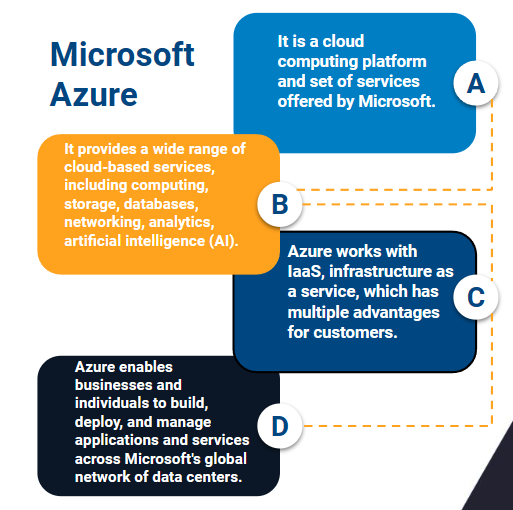How Azure is enabling businesses to move to the cloud
February 29, 2024
Table of contents
Quick Access

Microsoft Azure is one of the most widely used technologies today, due to the popularity of cloud computing and the rapid adoption of this solution by companies around the world.
Don't you know what cloud computing is? Let's let our partners at AWS explain this solution “Cloud computing is the on-demand delivery of IT resources over the Internet with pay-as-you-go pricing. Instead of purchasing, owning and maintaining physical servers and data centers, you can access technological services, such as computing power, storage and databases.”
Microsoft Azure Features That Make Migrating to Cloud Computing Easier
Scalability
Azure provides elastic scalability, allowing businesses to easily scale up or down based on their changing business needs. This ensures that businesses can handle fluctuating workloads without over-provisioning resources or incurring unnecessary costs.
Flexibility
One of the most important features of Azure is that it supports a variety of deployment models, including public, private, and hybrid clouds. This flexibility allows businesses to choose the deployment model that best suits their requirements, whether they need to leverage public cloud services, maintain on-premises infrastructure, or adopt a hybrid approach.

Migration tools and services
There can be no migration if the technology that is implemented does not have tools for this process, right? Azure offers a set of migration tools and services to streamline the migration process.
For example, Azure Migrate provides assessment and discovery tools to evaluate on-premises workloads and identify dependencies, helping businesses plan their migration strategy effectively. Additionally, services like Azure Site Recovery enable seamless migration of virtual machines and applications to Azure with minimal downtime.
Security and compliance
Security is paramount in any software product or project, which is why Azure prioritizes security and compliance, providing strong built-in security features and compliance certifications to ensure that business data is protected in the cloud.
Azure's full suite of security tools, including Azure Security Center and Microsoft Entra ID, help businesses proactively monitor, detect, and respond to security threats.
Cost management
Azure offers cost-effective pricing options and tools to help businesses optimize their cloud spend. Services like Azure Cost Management + Billing provide visibility into cloud usage and costs, allowing businesses to monitor, analyze, and optimize their spending on Azure resources.
Integration and interoperability
Azure integrates seamlessly with existing on-premises infrastructure and third-party applications, allowing businesses to leverage their existing investments while modernizing their IT infrastructure. Azure's rich set of APIs and integration capabilities enable interoperability with a wide range of systems and services.
Artificial intelligence and analytics
Following the trend of the moment, Microsoft Azure provides a set of analytics and artificial intelligence services that allow companies to obtain valuable insights from their data and drive innovation.
Services like Azure Machine Learning, Azure Databricks, and Azure Synapse Analytics enable businesses to build and deploy AI-based solutions, perform advanced analytics, and derive actionable insights from their data.
Overall, Azure's comprehensive set of services, along with its focus on security, compliance, and cost management, makes it a compelling option for businesses looking to migrate to the cloud and reap the benefits of digital transformation.
We recommend you on video
Related Blogs
Free Magento Commerce Features for an Online Store

How to use chatbots for e-commerce?

Which API is best for Android App Development Services

How to automate processes with Odoo software
What programming language is used with React Native?

